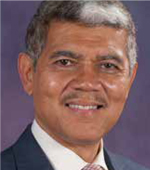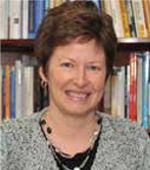Program participants
|
M. Roy Wilson, M.D., M.S., assumed the presidency of Wayne State University on August 1, 2013. Prior to joining Wayne State, Dr. Wilson was deputy director for strategic scientific planning and program coordination at the National Institute on Minority Health and Health Disparities of the National Institutes of Health (NIH). As deputy director, Dr. Wilson led the development and implementation of an integrated system for planning, coordinating and evaluating the NIH health disparities research portfolio, in collaboration with the NIH institutes and centers. He also co-chaired two NIH Common Fund programs, the Building Infrastructure Leading to Diversity Initiative and the National Research Mentoring Network. Previously, Dr. Wilson was dean of the School of Medicine and vice president for health sciences at Creighton University, president of the Texas Tech University Health Sciences Center, and, concurrently, chancellor of the University of Colorado Denver and chair of the Board of Directors of University of Colorado Hospital. Immediately prior to joining NIH, Dr. Wilson chaired the Board of Directors of Charles R. Drew University of Medicine and Science and was acting president part of that time. Under Dr. Wilson’s leadership, the university regained full institutional accreditation and stabilized its finances. Dr. Wilson received his undergraduate degree from Allegheny College, an M.S. in epidemiology from the University of California, Los Angeles, and an M.D. from Harvard Medical School. He was named among the Best Doctors in America for a consecutive 14 years by Best Doctors Inc. His additional honors include the American Academy of Ophthalmology’s Senior Achievement Award, the Distinguished Physician Award from the Minority Health Institute, the Herbert W. Nickens Award from the Association of American Medical Colleges, and the NIH Director’s Award. |
|
Mike Duggan is a proven turnaround specialist, having rescued Michigan’s largest county, a regional transportation system and the state’s top medical center from financial collapse. In each case, Duggan was able to engineer both financial and performance turnarounds in extraordinarily short periods of time by forging working partnerships with unions and implementing strong management principles. Some of Duggan’s most notable accomplishments include: Saving the Detroit Medical Center. Duggan became president and CEO of the Detroit Medical Center in January 2004, when the system was facing the planned closure of two flagship hospitals and thousands of layoffs after having lost nearly $500 million over the previous five years. Under Duggan’s leadership, the DMC made a profit for the first time since 1997, and has been profitable every year since. Turning around Wayne County finances. In 1987 at age 29, Duggan was named Deputy Wayne County Executive and became the engineer of a solvency package that helped the county eliminate a $130 million budget deficit and paved the way for 15 consecutive balanced budgets after 17 years of overruns. Crime Reduction. Duggan was Wayne County’s prosecutor from 2001 to 2003. Thanks to his strategies and strong partnerships with local, state and federal agencies, he was able to help lead Detroit to its lowest murder rate in 30 years. Jobs and Economic Development. In 1996, Duggan helped negotiate agreements with the Detroit Tigers and Detroit Lions to build new stadiums in downtown Detroit. As head of the Stadium Authority, he also made sure minority contractors received a significant percentage of the construction related work. Duggan also headed the negotiating team with Northwest Airlines that secured a $1 billion agreement to expand Metro Airport. He holds both undergraduate (1980) and law degrees (1983) from the University of Michigan. |
|
Kevyn Orr has practiced law in the areas of business restructuring, financial institution regulation and commercial litigation for three decades. He was appointed Emergency Manager for Detroit on March 14, 2013 and charged with restructuring the city. His previous restructuring experience has included service as chief government legal officer of a failed financial institution and as a special master to oversee the operations of a real estate development firm. He also has assisted clients with government requests for proposals and inspector-general audits. Upon graduation from law school in 1983, Orr joined a Miami, Fla., law firm as a litigator and became a shareholder of the firm in 1988. In 1991, he joined the litigation department of the Federal Deposit Insurance Corporation and shortly afterward transferred to the Resolution Trust Corporation (RTC). In 1994, Orr became assistant general counsel for complex litigation and bankruptcy at the RTC; in that capacity he litigated and supervised numerous high-profile cases concerning provisions of the Financial Institutions Reform, Recovery and Enforcement Act of 1989, as well as related federal statutes. He also supervised complex investigatory and bankruptcy matters handled by the agency. Those duties included serving as the chief lawyer responsible for the agency’s participation in the Whitewater investigation related to the failure of the Madison Guaranty Savings and Loan of Little Rock, Ark. Orr joined the Department of Justice in 1995 as deputy director of the Executive Office for United States Trustees. In February 2000, he became director of the United States Trustees Program. In 2001, Orr joined the Jones Day law firm where he served on the firm’s Advisory Committee and was the Firmwide Partner for Hiring and Diversity. He holds a bachelor of arts in political science (1979) and a law degree (1983) from the University of Michigan. |
|
Before becoming dean, Jocelyn Benson was an associate professor of law and associate director of the law school’s Damon J. Keith Center for Civil Rights. In that capacity she created the Michigan Allies Project, designed to track hate incidents throughout Michigan and provide legal support for victims. Her areas of expertise include civil rights law, education law and election law. She is widely quoted on those subjects in the media and has written numerous book chapters and law review articles. Dean Benson is founder of the nonpartisan Michigan Center for Election Law, which hosts projects that support transparency and integrity in elections. She has a B.A. from Wellesley College, a master of philosophy from Oxford and a law degree from Harvard. |
|
Cockrel is a 16-year veteran of Detroit City Council, leaving office in 2009. Since then she has been an adjunct faculty member of Wayne State University’s Irvin D. Reid Honors College and holds a seat on its Board of Visitors. She is president and CEO of the Crossroads Consulting Group, a firm specializing in providing assistance to companies looking to bring strategic business solutions to local governments. She is also a frequent guest on local broadcast news media outlets. She earned a bachelor of arts degree in philosophy and a master of arts in urban planning from Wayne State University. |
|
Margaret Williams was chair of the Management and Information Systems Department at Wayne State from January, 2010 until her appointment as interim dean in 2011. She came to Wayne State after 12 years on the faculty of the School of Business at Virginia Commonwealth University. She also has served on the faculty of Purdue University’s psychology department and its School of Management, where she taught in a top-ranked MBA program. Her research on employee compensation, leadership, employee perceptions of fairness in the workplace, and work-life issues appears in top management journals. She has a master’s in psychology from Purdue and an M.B.A. and Ph.D. from Indiana University. |
 President M. Roy Wilson
President M. Roy Wilson Mike Duggan
Mike Duggan Kevyn Orr
Kevyn Orr Jocelyn Benson
Jocelyn Benson Sheila Cockrel
Sheila Cockrel Margaret Williams
Margaret Williams